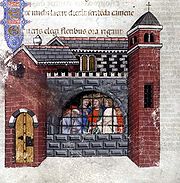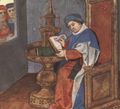
Dream vision
Encyclopedia

The dream-vision convention was widely used in European literature
European literature
European literature refers to the literature of Europe.European literature includes literature in many languages; among the most important of the modern written works are those in English, Spanish, French, Dutch, Polish, German, Italian, Modern Greek, Czech and Russian and works by the...
from late Latin
Late Latin
Late Latin is the scholarly name for the written Latin of Late Antiquity. The English dictionary definition of Late Latin dates this period from the 3rd to the 6th centuries AD extending in Spain to the 7th. This somewhat ambiguously defined period fits between Classical Latin and Medieval Latin...
times until the fifteenth century.
Latin



- Alain de LilleAlain de LilleAlain de Lille , French theologian and poet, was born, probably in Lille, some years before 1128.-Life:...
, "De planctu naturae" - Augustine of HippoAugustine of HippoAugustine of Hippo , also known as Augustine, St. Augustine, St. Austin, St. Augoustinos, Blessed Augustine, or St. Augustine the Blessed, was Bishop of Hippo Regius . He was a Latin-speaking philosopher and theologian who lived in the Roman Africa Province...
, "Soliloquia" - Boethius, De consolatione philosophiae
- CiceroCiceroMarcus Tullius Cicero , was a Roman philosopher, statesman, lawyer, political theorist, and Roman constitutionalist. He came from a wealthy municipal family of the equestrian order, and is widely considered one of Rome's greatest orators and prose stylists.He introduced the Romans to the chief...
, Dream of ScipioDream of ScipioThe Dream of Scipio , written by Cicero, is the sixth book of De re publica, and describes a fictional dream vision of the Roman general Scipio Aemilianus, set two years before he commanded at the destruction of Carthage in 146 BCE.Upon his arrival in Africa, Scipio Aemilianus is visited by his... - Macrobius, Commentary on Cicero's Dream of Scipio
- Brother Marcus, Visio Tnugdali, or The Vision of Tundale.
French
- Guillaume de LorrisGuillaume de LorrisGuillaume de Lorris was a French scholar and poet from Lorris. He was the author of the first section of the Roman de la Rose. Little is known about him, other than that he wrote the earlier section of the poem around 1230, and that the work was completed forty years later by Jean de Meun.-...
and Jean de MeunJean de MeunJean de Meun was a French author best known for his continuation of the Roman de la Rose.-Life:...
, Roman de la roseRoman de la RoseThe Roman de la rose, , is a medieval French poem styled as an allegorical dream vision. It is a notable instance of courtly literature. The work's stated purpose is to both entertain and to teach others about the Art of Love. At various times in the poem, the "Rose" of the title is seen as the...
, also translated into Middle English by Geoffrey ChaucerGeoffrey ChaucerGeoffrey Chaucer , known as the Father of English literature, is widely considered the greatest English poet of the Middle Ages and was the first poet to have been buried in Poet's Corner of Westminster Abbey... - Marie de FranceMarie de FranceMarie de France was a medieval poet who was probably born in France and lived in England during the late 12th century. She lived and wrote at an undisclosed court, but was almost certainly at least known about at the royal court of King Henry II of England...
, The Legend of the Purgatory of St. PatrickLegend of the Purgatory of St. PatrickL'Espurgatoire Seint Patriz or The Legend of the Purgatory of Saint Patrick is a 12th century poem by Marie de France. It is an Old French translation of a Latin text Tractatus de Purgatorio Sancti Patricii by the monk Henry of Saltrey. However, Marie's version is amplified from the original... - Le Chemin de Povreté et de Richesse, a 14th c. dream poem incorporated in Le Ménagier de ParisLe Menagier De ParisLe Ménagier De Paris is a French medieval guidebook from 1393 on a woman's proper behavior in marriage and running a household. It includes sexual advice, recipes, and gardening tips...
Italian
- Dante AlighieriDante AlighieriDurante degli Alighieri, mononymously referred to as Dante , was an Italian poet, prose writer, literary theorist, moral philosopher, and political thinker. He is best known for the monumental epic poem La commedia, later named La divina commedia ...
, The Divine ComedyThe Divine ComedyThe Divine Comedy is an epic poem written by Dante Alighieri between 1308 and his death in 1321. It is widely considered the preeminent work of Italian literature, and is seen as one of the greatest works of world literature...
– exemplifies the conventions of dream-vision literature, though Dante specifically says that his Comedy is not a dream vision.
Old English
- BedeBedeBede , also referred to as Saint Bede or the Venerable Bede , was a monk at the Northumbrian monastery of Saint Peter at Monkwearmouth, today part of Sunderland, England, and of its companion monastery, Saint Paul's, in modern Jarrow , both in the Kingdom of Northumbria...
, Vision of Drycthelm - Anonymous, The Dream of the Rood – the guide in Dream of the RoodDream of the RoodThe Dream of the Rood is one of the earliest Christian poems in the corpus of Old English literature and an example of the genre of dream poetry. Like most Old English poetry, it is written in alliterative verse. Rood is from the Old English rod "pole", specifically "crucifix"...
is the Cross on which ChristChristChrist is the English term for the Greek meaning "the anointed one". It is a translation of the Hebrew , usually transliterated into English as Messiah or Mashiach...
was crucified.
Middle English
- Geoffrey ChaucerGeoffrey ChaucerGeoffrey Chaucer , known as the Father of English literature, is widely considered the greatest English poet of the Middle Ages and was the first poet to have been buried in Poet's Corner of Westminster Abbey...
, Legend of Good Women, House of Fame, Book of the Duchess, Parliament of Fowls – The Parliament of Fowls features a dream vision in which the narrator falls asleep while reading the Dream of ScipioDream of ScipioThe Dream of Scipio , written by Cicero, is the sixth book of De re publica, and describes a fictional dream vision of the Roman general Scipio Aemilianus, set two years before he commanded at the destruction of Carthage in 146 BCE.Upon his arrival in Africa, Scipio Aemilianus is visited by his...
and is ushered into a walled gardenWalled gardenA walled garden is specifically a garden enclosed by high walls for horticultural rather than security purposes, though traditionally all gardens have been hedged about or walled for protection from animal or human intruders...
. He is chaperoned in the dream briefly by Scipio the Elder himself. - William LanglandWilliam LanglandWilliam Langland is the conjectured author of the 14th-century English dream-vision Piers Plowman.- Life :The attribution of Piers to Langland rests principally on the evidence of a manuscript held at Trinity College, Dublin...
, Piers PlowmanPiers PlowmanPiers Plowman or Visio Willelmi de Petro Plowman is the title of a Middle English allegorical narrative poem by William Langland. It is written in unrhymed alliterative verse divided into sections called "passus"...
or Visio Willelmi de Petro Ploughman (William's Vision of Piers Plowman) is an apocalyptic Middle EnglishMiddle EnglishMiddle English is the stage in the history of the English language during the High and Late Middle Ages, or roughly during the four centuries between the late 11th and the late 15th century....
allegorical narrative attributed to William LanglandWilliam LanglandWilliam Langland is the conjectured author of the 14th-century English dream-vision Piers Plowman.- Life :The attribution of Piers to Langland rests principally on the evidence of a manuscript held at Trinity College, Dublin...
, one of the great works of English literatureEnglish literatureEnglish literature is the literature written in the English language, including literature composed in English by writers not necessarily from England; for example, Robert Burns was Scottish, James Joyce was Irish, Joseph Conrad was Polish, Dylan Thomas was Welsh, Edgar Allan Poe was American, J....
. It is written in unrhymed alliterative verseAlliterative verseIn prosody, alliterative verse is a form of verse that uses alliteration as the principal structuring device to unify lines of poetry, as opposed to other devices such as rhyme. The most commonly studied traditions of alliterative verse are those found in the oldest literature of many Germanic...
divided into sections called "passus" (Latin for "step"). - Anonymous, Parlement of the Thre Ages
- Anonymous, Wynnere and WastoureWynnere and WastoureWynnere and Wastoure is a fragmentary Middle English poem written in alliterative verse sometime around the middle of the 14th century.-Manuscript:The poem occurs in a single manuscript, British Library Additional MS. 31042...
- Pearl PoetPearl PoetThe "Pearl Poet", or the "Gawain Poet", is the name given to the author of Pearl, an alliterative poem written in 14th-century Middle English. Its author appears also to have written the poems Sir Gawain and the Green Knight, Patience, and Cleanness; some scholars suggest the author may also have...
, PearlPearl (poem)Pearl is a Middle English alliterative poem written in the late 14th century. Its unknown author, designated the "Pearl poet" or "Gawain poet", is generally assumed, on the basis of dialect and stylistic evidence, to be the author of Sir Gawain and the Green Knight, Patience, and Cleanness or... - The Vision of Tundale – from the Latin Visio Tnugdali.
Welsh
- Anonymous, The Dream of RhonabwyThe Dream of RhonabwyThe Dream of Rhonabwy is a Middle Welsh prose tale. Set during the reign of Madog ap Maredudd, prince of Powys , it is dated to the late 12th or 13th century. It survives in only one manuscript, the Red Book of Hergest, and has been associated with the Mabinogion since its publication by Lady...
– possibly a satire on the medieval dream vision - Anonymous, The Dream of Macsen Wledig

